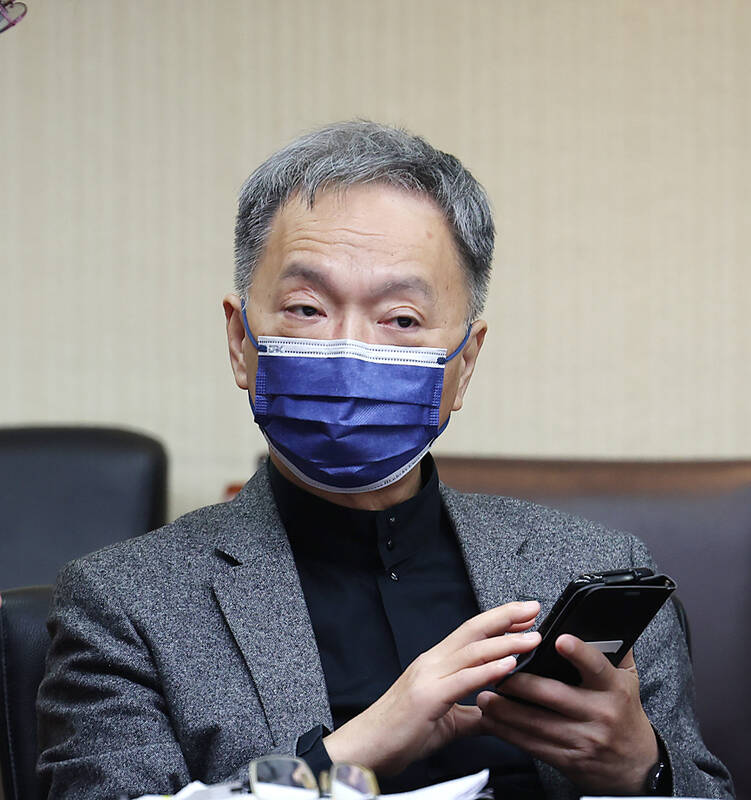Minister of Health and Welfare Hsueh Jui-yuan (薛瑞元) yesterday dismissed concerns that a bill on regenerative medicine would turn people into “laboratory mice,” saying that such therapies would still need to undergo phase 3 trials before they can be used on patients.
Hsueh’s remarks came as the legislature started reviewing two bills on regenerative medicine and regenerative medicine products, which were proposed by the Ministry of Health and Welfare, and approved by the Executive Yuan.
Regenerative medicine focuses on developing therapies to activate, replace, engineer or regenerate human cells, tissue, or organs, to restore or establish their normal function.

Photo: CNA
However, some civic groups said the bills could expand the use of regenerative medicine, for example by allowing allogeneic therapies, which could lead to higher risk of immune rejection.
The bills have loose safety control mechanisms over such issues, the groups said.
Allogeneic therapies use cells collected from a donor and manufactured in large batches to treat multiple patients, in contrast to autologous therapies, which use cells collected from the patient’s body.
The groups said that if the bills are passed, patients might spend large sums of money on novel regenerative therapies that offer less protection, resulting in them “paying to become laboratory mice.”
Hsueh called such concerns “a big misunderstanding,” saying that regenerative therapies and regenerative medicine products must pass human clinical trials before obtaining a permit.
The groups likely have the misconception that regenerative therapies and medicine would be used on patients without passing human trials, he said.
However, clinical trials for regenerative therapies and medicine would be different from those for chemical medicine, he added.
A randomized and double-blind phase 3 clinical trial would not be suitable for clinical trials for regenerative therapies and medicine, Hsueh said.
He said a regenerative therapy for cancer treatment could first deal with terminating the cancer cells in the body and then injecting engineered cells or tissue to a certain part of the body for it to become therapeutically effective, so it cannot be injected into a healthy study participant.

The first global hotel Keys Selection by the Michelin Guide includes four hotels in Taiwan, Michelin announced yesterday. All four received the “Michelin One Key,” indicating guests are to experience a “very special stay” at any of the locations as the establishments are “a true gem with personality. Service always goes the extra mile, and the hotel provides much more than others in its price range.” Of the four hotels, three are located in Taipei and one in Taichung. In Taipei, the One Key accolades were awarded to the Capella Taipei, Kimpton Da An Taipei and Mandarin Oriental Taipei. Capella Taipei was described by

EVA Airways today confirmed the death of a flight attendant on Saturday upon their return to Taiwan and said an internal investigation has been launched, as criticism mounted over a social media post accusing the airline of failing to offer sufficient employee protections. According to the post, the flight attendant complained of feeling sick on board a flight, but was unable to take sick leave or access medical care. The crew member allegedly did not receive assistance from the chief purser, who failed to heed their requests for medical attention or call an ambulance once the flight landed, the post said. As sick

The Taichung District Court yesterday confirmed its final ruling that the marriage between teenage heir Lai (賴) and a man surnamed Hsia (夏) was legally invalid, preventing Hsia from inheriting Lai’s NT$500 million (US$16.37 million) estate. The court confirmed that Hsia chose not to appeal the civil judgement after the court handed down its ruling in June, making the decision final. In the June ruling, the court said that Lai, 18, and Hsia, 26, showed “no mutual admiration before the marriage” and that their interactions were “distant and unfamiliar.” The judge concluded that the couple lacked the “true intention of

A drunk woman was sexually assaulted inside a crowded concourse of Taipei Railway Station on Thursday last week before a foreign tourist notified police, leading to calls for better education on bystander intervention and review of security infrastructure. The man, surnamed Chiu (邱), was taken into custody on charges of sexual assault, taking advantage of the woman’s condition and public indecency. Police discovered that Chiu was a fugitive with prior convictions for vehicle theft. He has been taken into custody and is to complete his unserved six-month sentence, police said. On Thursday last week, Chiu was seen wearing a white